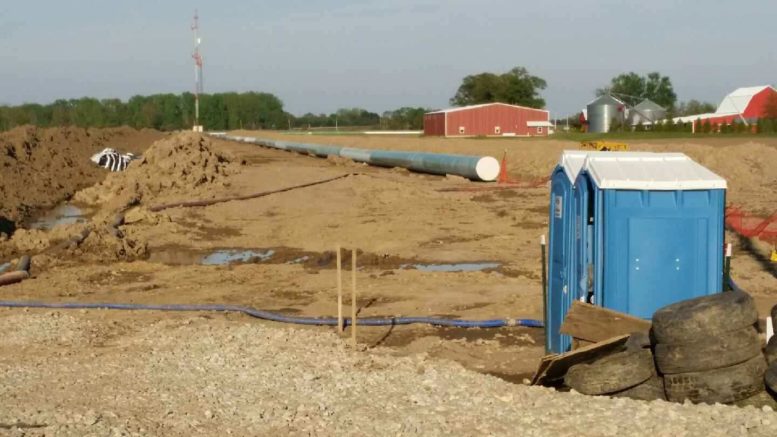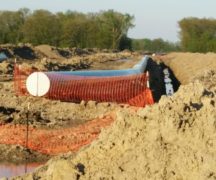By JAN LARSON McLAUGHLIN
BG Independent News
Officials from Rover Pipeline – the company with 19 Ohio EPA violations so far and $2.3 million in fines and damages – presented some checks Tuesday to help first responders.
The $10,000 checks, “offered in goodwill by the company,” are going to the emergency management agencies in each of the 18 counties in Ohio being traversed by Rover pipeline. Wood County is one of those on the route. The funds are to be used to purchase new equipment or offer additional training .
“We hope these funds will go toward emergency first responders,” Bill Barth, senior specialist for emergency response with Rover, said as he passed on the giant checks. “We look forward to working with you.”
Wood County EMA Director Brad Gilbert is grateful for the funds, but he would just as soon not have to work on a pipeline incident. He may use the check from Rover to help put a state MARCs radio system in the sheriff’s dispatch center. The $10,000 donation will pay just a portion of the total $40,000 expense.
“The pressure’s on them to do the right thing during construction and operations,” Gilbert said of the pipeline. “Hopefully we don’t need it for any issues with them.”
However, Rover’s accident record isn’t exactly clean.

Rover pipeline checks presented to emergency management agencies from Wood, Hancock and Seneca counties.
The check presentations come on the heels of Rover Pipeline being cited for a 19th environmental violation. Most recently, the Ohio EPA cited Rover for spilling contaminants into the Mohican River in Ashland County.
When questioned about the level of trust counties should have in Rover, the company’s communications specialist said the 19 citations are based on Ohio EPA’s definition of a violation.
“We’re showing different data,” Alexis Daniel said Tuesday as the pipeline firm prepared to hand out the giant checks in the Wood County Courthouse atrium to the EMA directors from Wood, Hancock and Seneca counties.
The Rover pipeline is being constructed through southern Wood County on its way from West Virginia to Ontario, Canada.
Despite the Ohio EPA’s records, Daniel said Rover has “not had an abundance of spills.”
“The environment is very important to us,” she said. “We’ve been pretty diligent in following all the extra requirements” that were put in place after the Federal Energy Regulatory Commission halted the pipeline work earlier this year.
For more than four months, Rover had been under federal orders halting horizontal drilling at new Ohio locations due to numerous environmental violations. Among those was the release of more than two million gallons of industrial waste (drilling mud contaminated with diesel fuel) into a wetland in Tuscarawas County. The pipeline company subsequently dumped that same material into local quarries near sources for public drinking water.
In this latest incident, the pipeline construction caused 200 gallons of bentonite-based drilling fluid to be released into a tributary of the Mohican River in Ashland County.
Currently, Rover is also in violation of Ohio EPA’s orders from July, which required the company to file for a construction storm water general permit. The company has refused to comply with the order or pay the civil penalty.
The state of Ohio filed a lawsuit against the Rover Pipeline on Friday, accusing pipeline operators Energy Transfer Partners, of discharging several million gallons of drilling fluid into local wetlands. The construction crews also mistakenly demolished a historic building in the way of the pipeline.
On Tuesday, Daniel said Ohio EPA Director Craig Butler paints an unfair picture of Rover Pipeline.
“It seems like he wants to argue it out in the media,” she said. “The people we speak with on the ground are happy with our work.”
Daniel stressed that when Rover has discharged contaminated material into the environment, the company immediately contains the material and cleans up before starting again on pipeline construction.
She also disputed the Ohio EPA’s claim that Rover owes $2.3 million in fines and damages – though she couldn’t explain. “We don’t speak on pending litigation,” Daniel said.
Environmental protection groups have little trust in Rover, and point to the company’s apparent disregard for Ohio’s water, soil and air.
“This company has a terrible track record in Ohio,” said Melanie Houston, director of climate programs for the Ohio Environmental Council. “They’ve proven time and time again that they can’t clean up their act. We’re very concerned.”
OEC supports the Ohio EPA’s request that Rover put its drilling on pause until the company proves it can do horizontal directional drilling safely.
Houston pointed to the latest release into the Mohican River.
“We can’t stand idly by while this river is threatened by the same company that devastated wetlands, historic places, and natural areas across our state,” Houston said. “Just this year, the Rover Pipeline has had 19 violations, with the fifth most recent occurring after the company received FERC permission to resume drilling. This blatant disrespect for Ohioans and our natural places is inexcusable and Energy Transfer Partners must be held accountable.”





